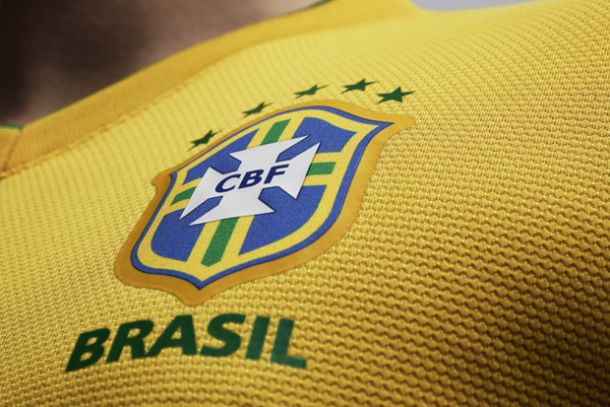Background Information:
Some believe that football was brought to Brazil by British and Dutch sailors in the second half of the 19th century. The accepted consensus is that Charles Miller, who was born in Brazil but educated in England, returned to his birthplace in 1894 with two footballs, a rule book and a set of playing kit to teach the locals of Sao Paulo the laws of the beautiful game.
The first recorded football match in Brazil was organized by Miller and took place the following year between employees of the local gas company and Sao Paulo Railways, which the latter side won 4-2. The game created fervent interest in the sport and within just a few years the first club sides were springing up in Sao Paulo and beyond, such as Sao Paulo Athletic Club, Mackenzie Athletic Association, Germania, Internacional and Paulistino.
In 1901 the Sao Paulo League was formally established. Rio de Janeiro followed suit and in 1914 the Brazilian national team played its first official international fixture, losing 3-0 to neighbors Argentina. The Brazilian Confederation of Sport was formed in 1914 and football became far more organized, yet competitions were still only staged within individual states and the game did not begin to resemble a professional sport until 1933.
International Play/Olympics/World Cups:
Brazil hosted the 1950 World Cup and built the famous Maracana Stadium. They finished second to Uruguay which was devastating but it was also an indication that the country was fast emerging as a major force in world football. Eight years later, Brazil was hailed world champions in a tournament that saw the arrival of 17-year-old Pele in a side that also included Garrincha, Zagalo and Gilmar. In 1962, with the majority of the same team, Brazil retained the World Cup, defeating Czechoslovakia 3-1 in the final.
Brazil's dominance at the international level was also reflected on the domestic front, as Pele's team, Santos, won the World Cup in 1962 and 1963, defeating Benfica and Milan respectively. However, it would be 18 years until a Brazilian team, the Zico-inspired Flamengo, would again emerge victorious in the competition.
On the international stage, Brazil continued to impress and the World Cup winning side of 1970 is regarded by many as the greatest team in the history of the sport.
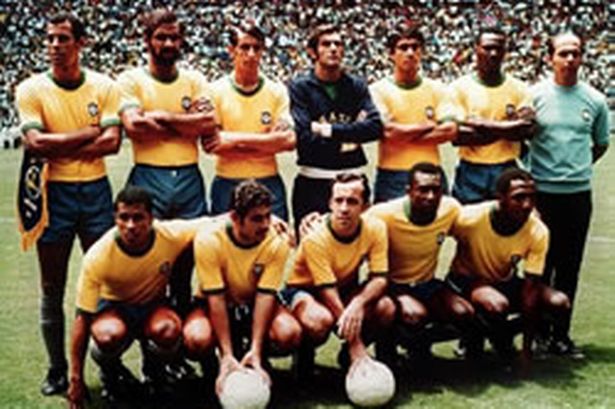
With Pele at his peak, his teammates Rivelino, Jairzinho and Carlos Alberto also became household names as the team swept all before them. The finals, held in Mexico, were also the first to be televised in color, bringing another dimension to their samba flair. Certainly Carlos Alberto's emphatic strike in the 4-1 final win against Italy remains an enduring image.
Shortly after Pele's retirement from international play, the country continued to be a source of great talent yielding the likes of Paulo Cesar, Zico, Falcao, Socrates and Cerezon, but the national team failed to deliver on the world stage for 24 years.
Brazil had won silver medals at the 1984 and 1988 Olympics, and players from those teams provided the stars of the 1994 World Cup squad. Goalkeeper Taffarel, strikers Romario and Bebeto and defender Jorginho stepped up from the 1988 side, while captain Dunga was a veteran from 1984, and together their potential came to fruition with a penalties victory over Italy in the 1994 World Cup Final.
With a new sense of belief restored to the national team, young players such as Ronaldo, Rivaldo and Denilson helped Brazil reach the 1998 World Cup Final, this time facing hosts France. A illness to Ronaldo on the morning of game day eliminated any chances of winning a 2nd consecutive World Cup, but four years later the player made amends as an exciting and attacking Brazil side captured another World Cup in 2002. Ronaldo scored eight goals in the competition and four in the quarter-finals, he became the World Cup's all-time scorer, breaking Gerd Muller's record.
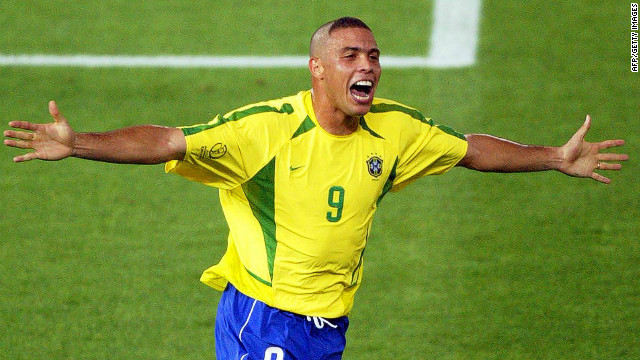
Dunga coached Brazil to success in the Copa America in 2007 and led the team to the 2010 World Cup, controversially leaving some of the country's big name stars off the list while adding a solid defense to the team. However, despite playing like potential champions, a shock defeat to Holland (Netherlands) in the quarter-final ended Brazil's campaign and Dunga's stint as coach.
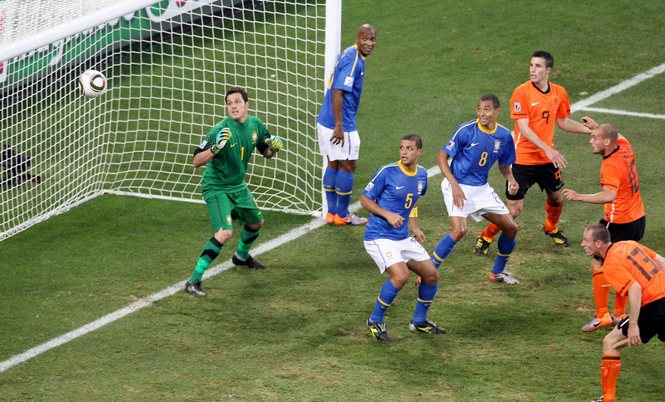
Shortly after the heartbreaking defeat against Holland in 2010, Brazil regrouped and focused on the 2012 Olympic Games in London. This time with their young star Neymar Jr., Brazil looked to take home gold but would fall short losing to Mexico 2-1 in the finals.
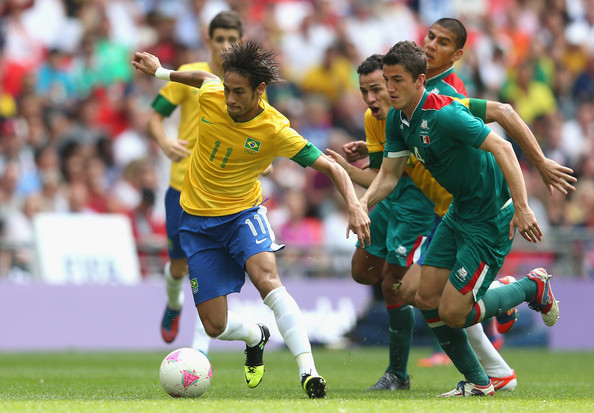
Just two years after the Olympics in London, Brazil was preparing for one of the biggest events in their history, the 2014 World Cup. For Brazilians, the 2014 World Cup can be defined in two words: Pressure and heartbreak. Whenever the host nation goes out on to the pitch in a World Cup game, the pressure is always there. The pressure is maximized to 500% when the host nation happens to be Brazil. Former Brazilian star Ronaldo spoke out before the World Cup started saying, "The players, when they don't know if they are going to win or lose, by definition, they are under enormous pressure".
Brazil was just one win away from advancing to their 7th World Cup Finals appearance but would be absolutely obliterated in the semi-final game to Germany. Brazil entered the semi-finals without their Captain Thiago Silva (accumulation of yellow cards) and the star of the team Neymar Jr. (fractured vertebrae in quarterfinals) making their chances of beating the Germans highly unlikely. Come game time, every Brazilian had their eyes fixated on the T.V. as they watched their pride and joy get ousted by the Germans in a 7-1 defeat. The faces of the Brazilian people were chilling and looked like something out of a horror movie, they were completely stunned and shocked. Shortly after Brazils 3-0 third place loss to the hands of the Dutch, head coach Luiz Felipe Scolari decided to resign.
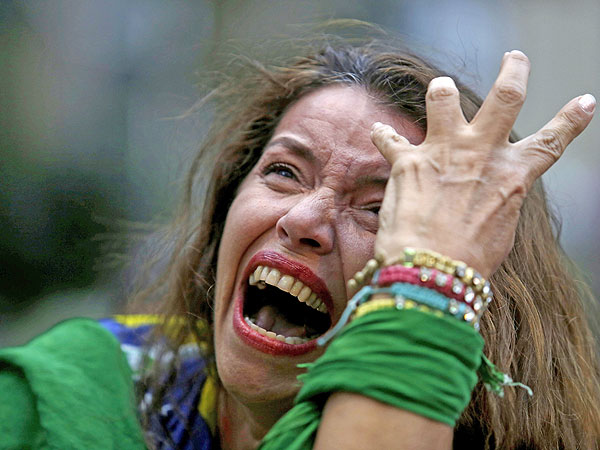
However, the Brazil National Team will be loved by their country through thick and thin. It is a love that will never fail in sports. Here is a compilation of some of the best goals in the squad's history to close this article.









































